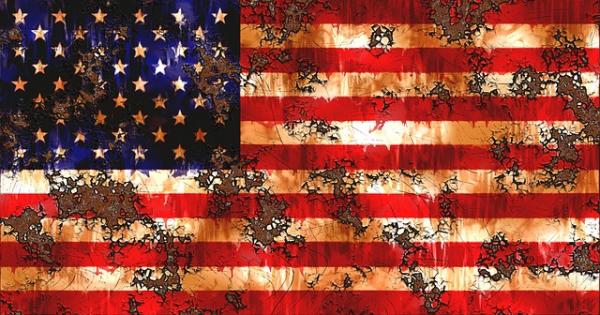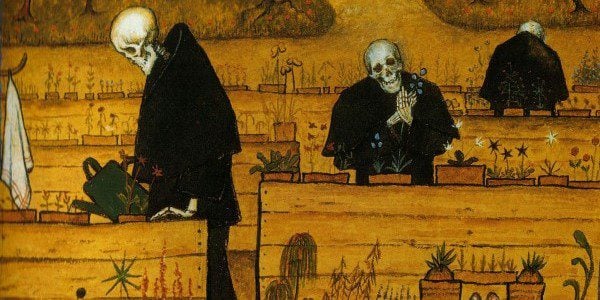This is the second post in a series of reflections on Beck’s excellent book, The Slavery of Death.
Oops. Did I say “excellent” book? I meant to say “good,” “good enough,” or maybe even “very good.”
You’ll see why in a minute.
In Part 1, Beck sets up his argument by suggesting that perhaps we (Western Christians) have been wrong in assuming that sin gives rise to death; perhaps it’s the other way around. The pervasive, inevitable reality of death creates the conditions under which human beings sin. We sin out of and because of our response to the fear of death. We are slaves, to the fear of death, and this means we are beholden to the principalities and powers of death. In Part II, he goes on to explain this further, and now from the standpoint of psychology of death anxiety.
Ernest Becker, one of the “fathers,” so to speak of the psychology of death anxiety (and a forerunner to Terror Management Theory, which has demonstrated the legitimacy of Becker’s theories through many, cross-cultural, empirical studies), distinguished between “basic anxiety” and “neurotic anxiety.” Beck summarizes the difference this way:
Basic anxiety is the anxiety of biological survival, the anxiety of our fight-or-flight response, the anxiety associated
with vigilantly monitoring threats in our physical environment. Basic anxiety is connected to the survival instincts we have as biodegradable animals in a world of real or potential scarcity. The logic here, as we’ve noted, is fairly straightforward: in the face of survival threats, our self-interest intensifies. And if the situation is dire, violence breaks out (28).
Neurotic anxiety, on the other hand, is less immediate and direct. In Beck’s words again:
Unlike basic anxiety, neurotic anxiety isn’t involved in monitoring environmental threats and resources. Rather, it is characterized by worries, fears, and apprehensions associated with our self-concept, much of which is driven by how we compare ourselves to those in our social world. Feelings of insecurity, low self-esteem, obsessions, perfectionism, ambitiousness, envy, narcissism, jealousy, rivalry, competitiveness, self-consciousness, guilt, and shame are all examples of neurotic anxiety, and they all relate to how we evaluate ourselves in our own eyes and the eyes of others (28).
Basic death anxiety is easy to understand and to recognize in action. However, basic death anxiety rarely factors in the day-to-day lives of technologically advanced and relatively peaceful modern societies. And we mange relatively well to suppress basic death anxiety by simply staving it off–buttressing it by extending life through various medical and technological advancements. Furthermore, we in the U.S. aren’t typically (directly, anyway) physically fighting over scarce resources (unless it’s Black Friday), so basic death anxiety doesn’t factor heavily in our relational lives–at least those of us with enough resources to make it through each day. Neurotic death anxiety, however, is a major factor in our day-to-day lives. According to Becker, neurotic anxiety lies at the very basis of what we typically call “self-esteem.” We build up existential fortresses against the fear of death by pursuing cultural achievements, whether major or small. For the select few among us, these cultural achievements might include winning multiple Super Bowls (and perhaps at any cost!), but for the rest of us, these achievements might be rather more mundane: job promotions, published articles or books, having children, or buying a bigger house or better car. These achievements are avenues or pathways created within our cultural framework (what Becker called a “cultural hero system”) whereby each of us has the choice to engage those avenues in order to create our own sense of immortality. By the way, the basic intuition of this theory (which, admittedly, is a rather all-encompassing theory), has been demonstrated time and again by research under the rubric of Terror Management Theory (Note: terror management refers to how humans manage the existential terror created by the inevitability of death). Our particular culture values excellence. We are very accustomed to comparing one another–and ourselves with one another–so as to determine whom among us merits the “excellence” label. Who is the best quarterback ever? Manning? Montana? Brady?
Beck’s fascinating suggestion is that perhaps there is a way to weasel out of the trappings of the cultural hero system, and our system in particular which idolizes excellence at the expense of personal relationships, psychological and physical health. If we are not aware that the fundamental driver of the quest for excellence is a neurotic fear of our coming demise, then we will never be able to escape our “slavery to the fear of death.” Both Beck and Becker acknowledge that many positive things result from our culture’s relentless pursuit of excellence (art, technology, medicine, education, etc. and etc.). But without an understanding of the neurotic base of that pursuit (and of the unhealthy ways we compare ourselves to ridiculously high standards), our society might continue to be, in the words of Sheldon Solomon, a “petri dish of psychopathologies.” Perhaps we would do better to aspire simply to be “good enough.”
In a subsequent post, I will unpack a bit how Beck thinks we might begin to find some respite from the cultural hero system and from the relentless pursuit of excellence. As a hint, he draws on the important work of theologian David Kelsey, with his phrase “eccentric existence.”
In the post following that one, I want to explore the dynamics of death anxiety in relation to suicide. The tragic phenomenon of suicide seems like a counter-example to the theory that humans are driven by a fear of death and will do whatever they can to stave it off as long as they can (and to suppress even thinking about it). Beck touches on the subject only briefly, but I will refer to a recent study which suggests that, for those with suicidal inclinations or easily drawn to suicidal thoughts, fear of life sometimes trumps their fear of death.
photo credit: <a href=”https://www.flickr.com/photos/special/108160/”>Special</a> via <a href=”http://photopin.com”>photopin</a> <a href=”http://creativecommons.org/licenses/by-nc/2.0/”>cc</a>











